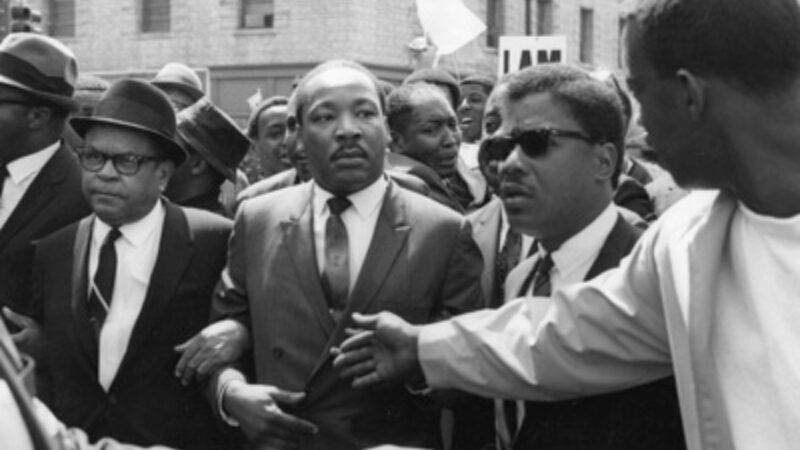SCOTUS Misses a Chance To Protect Peaceful Protesters
Under a legal theory endorsed by the 5th Circuit, Martin Luther King Jr. could have been liable for other people’s violence.

In his last protest march, Martin Luther King Jr. led a parade of demonstrators down Beale Street in Memphis, lending his support to striking sanitation workers. After a few young black men started breaking storefront windows, the indiscriminate police response killed one suspected looter and injured dozens of protesters.
Under a legal theory blessed by the U.S. Court of Appeals for the 5th Circuit, King could have been held liable for the unanticipated harm that ensued from that March 1968 protest, even though he neither directed nor advocated vandalism or violence. On Monday, the U.S. Supreme Court declined to review that decision, which threatens to chill the exercise of First Amendment rights by exposing protest leaders to crushing civil liability based on conduct beyond their control.
The case involves a lawsuit that blames Black Lives Matter leader DeRay Mckesson for the injuries that a police officer suffered during a 2016 demonstration in Baton Rouge after someone hurled "a piece of concrete or a similar rock-like object" that struck him in the head. Last June, a divided 5th Circuit panel allowed that lawsuit to proceed on the theory that Mckesson "negligently" organized a protest on the street outside police headquarters when it was "reasonably foreseeable for the police to respond, and violence to ensue."
That ruling flies in the face of First Amendment principles that the Supreme Court reaffirmed less than two weeks later. In Counterman v. Colorado, which involved a man who had sent hundreds of alarming Facebook messages to a local musician, the Court held that mere negligence was not enough to hold him criminally liable for "true threats."
In this context, Justice Elena Kagan said in the majority opinion, the appropriate standard is recklessness, meaning "the defendant consciously disregarded a substantial risk that his communications would be viewed as threatening violence." That more demanding standard is necessary, she explained, because a negligence test, which does not require an awareness of risk, was apt to "chill protected, non-threatening speech."
Kagan noted that "our incitement decisions demand more" than recklessness. "When incitement is at issue, we have spoken in terms of specific intent," she wrote, recognizing that "incitement to disorder is commonly a hair's breadth away from political 'advocacy.'"
Even when someone endorses unlawful conduct, the Court held in 1969, their speech is constitutionally protected unless it is both "directed" at inciting "imminent lawless action" and "likely" to do so. The Court applied that principle in a 1982 case involving a largely peaceful but sometimes violent boycott of white merchants in Claiborne County, Mississippi, that the National Association for the Advancement of Colored People launched in 1966.
Unlike Mckesson, boycott leader Charles Evers had endorsed violence, saying, "If we catch any of you going in any of them racist stores, we're gonna break your damn neck." The Court nevertheless ruled that Evers could not be sued for damages suffered by white business owners.
Under these precedents, dissenting 5th Circuit Judge Don Willett thought, it is clear that Mckesson cannot be held responsible for someone else's violence. He warned that the majority's "novel 'negligent protest' theory of liability" would "reduce First Amendment protections for protest leaders to a phantasm, almost incapable of real-world effect."
Such a rule, Willett said, "would have enfeebled America's street-blocking civil rights movement, imposing ruinous financial liability against citizens for exercising core First Amendment freedoms." He cited King's 1968 march in Memphis as an example.
There is still time to heed Willett's warning. As Justice Sonia Sotomayor noted when the Supreme Court turned away Mckesson's appeal, that decision "expresses no view about the merits" of his First Amendment claim, which the lower courts can now consider in light of Counterman.
"It is disappointing that the Court did not take the opportunity to bring this case to an end," said David Goldberg, Mckesson's lawyer. "But I am confident that the Court eventually will consider and repudiate this dangerous rule of law."
© Copyright 2024 by Creators Syndicate Inc.


Show Comments (27)